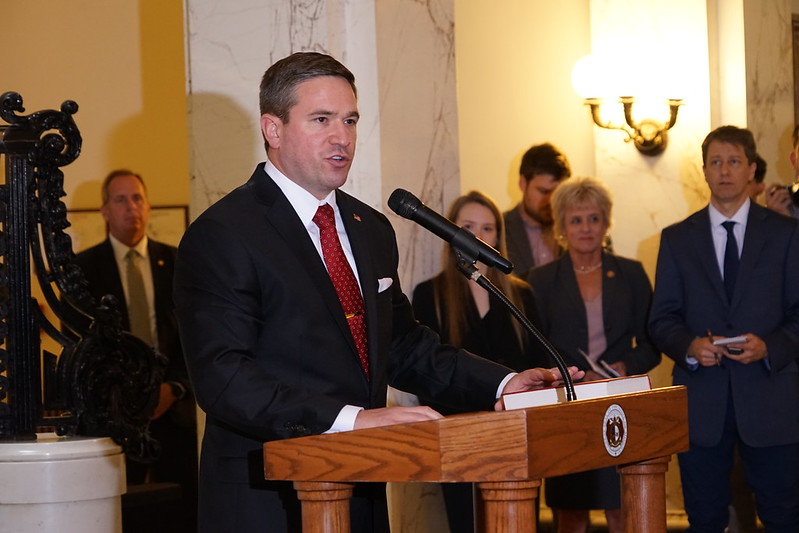Missouri attorney general set to finally start work on public records requests submitted this year

By the end of the month, Missouri Attorney General Andrew Bailey expects to complete work on the mountain of public records requests submitted to the office last year.
That will allow the five-person team working through the Sunshine Law backlog to finally turn its attention to the nearly 300 pending requests filed since Bailey took office in January.
“I’m proud of the thorough and expeditious work we’ve done to get Missourians the records they have requested,” Bailey said in an emailed statement.
First Amendment and government transparency advocates, however, aren’t so sanguine about Bailey’s efforts.
Records requests filed since January have continued to pile up, leaving many waiting more than a year for Bailey’s office to take any action. And new requests, no matter how simple and easy to turn around, are still projected to take at least six months to be completed.
The attorney general’s website declares that the Sunshine Law is the “embodiment of Missouri’s commitment to openness in government,” said Bernie Rhodes, a First Amendment attorney who has represented numerous media outlets, including The Independent.
By allowing requests to pile up and wither on the vine, Rhodes said, Bailey isn’t living up to those standards.
“It’s called the Sunshine Law for a reason. It exposes sunlight on what our government is doing. If we have to wait six months to find out what someone did last week, it may be too late to do anything about that,” Rhodes said.
“It’s not called the historical records preservation act, so that when we write the biography of Andrew Bailey 20 years from now we know what he was doing,” he said. “It exists so we know what he’s doing today so that when he comes up for election, we know whether to vote for him or not.”
Bailey inherited 224 unfinished public records requests from his predecessor, U.S. Sen. Eric Schmitt. Since then, the office implemented a policy to work through the backlog on a first come, first served basis. Newer inquiries that are small and easily dispensed with sit in limbo as staff work on older and more expansive requests.
For example, copies of Bailey’s official calendar on Nov. 6 and 7 won’t be available until May 2024. A request like that is typically turned around in a matter of days by other government agencies, if not sooner.
“It remains deeply concerning that the attorney general’s office refuses to take a common sense approach to fulfilling Sunshine Law requests,” said David Roland, director of litigation for the libertarian nonprofit Freedom Center of Missouri.
“If a citizen’s request could be fulfilled in a matter of minutes,” Roland said, “it is manifestly unreasonable for the office to delay the fulfillment of that request by several months, even if that might require addressing requests in an order other than which they were received.”
Jean Maneke, an attorney with the Missouri Press Association, said delayed access to public records is a slap in the face to transparent government.
“Public servants,” she said, “are not acting in the public interest when they delay serving the public in this matter.”
Bailey has defended how his office has handled the backlog, arguing that the office processes requests in order to avoid the perception it is “picking winners and losers.”
“You’ve got to fulfill them in the order in which they came in, or you run the risk of people saying that you’re cherry-picking favorable requests,” Bailey recently told the Springfield News-Leader. “It’s a no-win situation.”
To demonstrate his commitment to government transparency, the attorney general has pointed out that, unlike many state agencies, his office doesn’t charge anything for processing public records requests.
Madeline Sieren, Bailey’s spokesperson, said by the end of the year the attorney general’s office will have completed 56 separate Sunshine Law trainings. That’s the most in terms office’s history, she said, and up from 51 in 2022 and 42 in 2021.
The 2023 total is double Schmitt’s first year as attorney general in 2019.
“Our total attendance was in the thousands, across all of our presentations this year,” she said.
Sieren added that the attorney general’s office also “significantly improved the efficiency, speed, and results in addressing Sunshine Law complaints.”
Since Bailey took office, she said, “we have closed 525 Sunshine Law complaints, which were received both this year and in previous years. This includes approximately 20 warning letters that typically included training as a condition in lieu of further enforcement action and over 40 situations where we assisted citizens in obtaining records due to our intervention through the complaint process.”
But transparency advocates remain skeptical.
Part of the concern is Bailey’s role in crafting legislation while working as general counsel for Gov. Mike Parson to weaken Missouri’s Sunshine Law. A major policy priority for the governor during Bailey’s tenure, the legislation would have allowed government agencies to withhold more information from the public and charge more for any records that are turned over.
Rhodes said Bailey is “absolutely in violation of the Sunshine Law” by not promptly processing public records requests. If government transparency was really a priority for him, Bailey could “dispense with the backlog immediately by choosing to staff his office in a way that acknowledges Missouri’s commitment to open government.”
“If his staff says they can’t get to requests in a timely manner, those are crocodile tears,” Rhodes said. “He inherited a bunch of lawsuits, too, so is he just going to ignore those? That’s his job. He should just do his job.”
For his part, Bailey does not begrudge Schmitt for the backlog his staff is stuck with.
“My predecessors left behind a legacy of excellence,” Bailey said in an email to The Independent. “Because of the great work they did, there’s a lot of attention on our office, which resulted in a lot of Sunshine requests being filed.”
Miss Clipping Out Stories to Save for Later?
Click the Purchase Story button below to order a print of this story. We will print it for you on matte photo paper to keep forever.

